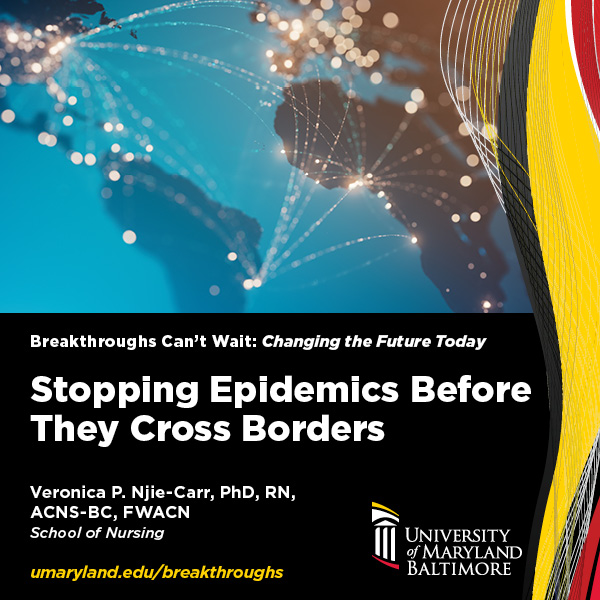Breakthroughs Can’t Wait: Can Building Research Capacity Abroad Stop the Next Pandemic?
August 20, 2025 UMB Office of Communications and Public Affairs
The School of Nursing’s Veronica P.S. Njie-Carr, PhD, RN, ACNS-BC, FWACN, is leading a cross-continental effort to build research capacity where it’s needed the most.
At the University of Maryland, Baltimore (UMB), groundbreaking discoveries happen every day — transforming medicine, improving health, and shaping the future. From changing legal policy to pioneering treatments to cutting-edge scientific breakthroughs, UMB researchers are tackling real-world challenges and making a lasting impact on lives everywhere.
In our “Breakthroughs Can’t Wait: Changing the Future Today” series of videos, we will dive into inspiring stories of innovation from across UMB’s seven schools. See how scientists, doctors, and experts are addressing today’s most pressing issues — fueled by the critical support of government funding that drives progress forward.
Public health threats don’t stop at borders, and neither should the work to stop them.
At the University of Maryland School of Nursing, Veronica P.S. Njie-Carr, PhD, RN, ACNS-BC, FWACN, is leading a cross-continental effort to build research capacity where it’s needed the most. With funding from the Fogarty International Center at the National Institutes of Health, she’s collaborating with partners in The Gambia to train future generations of health professionals in research ethics and methodology, the foundation for a stronger, faster response to health crises before they spread.
“We are training health professionals and research scholars to conduct research with high ethical standards and scientific rigor to address the urgent health needs in The Gambia,” Njie-Carr said. “This work strengthens global health systems as well as human capacity to protect all of us.”
Those urgent needs include HIV, cardiovascular and respiratory diseases, cancer, COVID, and Mpox. Njie-Carr’s efforts have encompassed launching two academic programs in research ethics and methodology—a postgraduate certificate and a master’s degree—as well as implementing professional development activities through workshops and conferences, and a formal mentoring program with collaborators at the University of the Gambia, Medical Research Council Unit, The Gambia, and partners at the University of Ibadan, Nigeria, and the University of Ghana. Recent graduates are already stepping into leadership roles: helping to draft national ethics frameworks, joining environmental research ethics initiatives in climate science, and pursuing PhDs to continue their work.
Njie-Carr emphasized that preparing for the next outbreak means investing in public health systems that can contain disease at its source. “If capacity development work is not taking place in other countries,” she explained, “we then open doors for diseases to cross borders.”
In a new video Q&A, Njie-Carr shares why global health begins with local expertise.
Read more about how UMB researchers are tackling real-world challenges and making a lasting impact on lives everywhere.